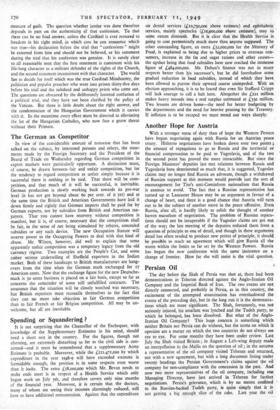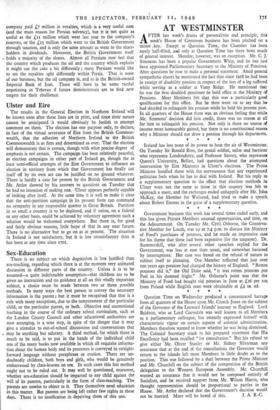Persian Oil
The day before the Shah of Persia was shot at, there had been demonstrations in Teheran directed against the Anglo-Iranian Oil Company and the Imperial Bank of Iran. The two events are not directly connected, and probably in Persia, as in this country, the excitement of the attempted assassination has overshadowed the events of the preceding day, but in the long run it is the demonstra- tions which are more significant. The Shah, fortunately, was not seriously injured, his assailant was lynched and the Tudeh party, to which he belonged, has been dissolved. But what of the Anglo- Iranian Oil Company? This huge concern is .something which neither Britain nor Persia can do without, but the terms on which it operates are a matter on which the two countries do not always see eye to eye. For some months they have been under review. Last July the Shah visited Britain ; in August a Left-wing deputy made an interpellation in the Majlis on the question of oil ; in the autumn a representative of the oil company visited Teheran and returned, not with a new agreement, but with a long document listing under twenty headings the Persian Government's claims against the oil company for non-compliance with the concession in the past. And now two more representatives of the oil company, including one Managing Director, have just arrived in Teheran for further negotiations. Persia's grievance, which is by no means confined to the Russian-backed Tudeh party, is quite simply that it is not getting a big enough slice of the cake. Last year, the oil company paid £7 million in royalties, which is a very useful sum (and the main reason for Persian solvency), but it is not quite as useful as the £ti million which went last year to the company's reserves, or the L's million which went to the British Government through taxation, and is only the same amount as went to the share-
holders in dividends. Moreover, the British Government itself • holds a majority of the shares. Almost all Persians now feel that the country which produces the oil and the country which exploits it might cut the cake a bit differently ; many Persians would like to see the royalties split differently within Persia. That is none of our business, but the oil company is, and so is the British-owned Imperial Bank of Iran. There will have to be some tactful negotiating in Teheran if future demonstrators are to find new targets for their ebullience.







































 Previous page
Previous page